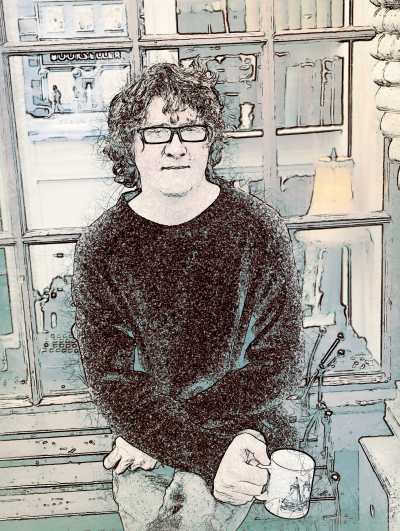Locked Down in a Scottish Bookshop
Bookseller Shaun Bythell can be famously curmudgeonly about his customers. But while reflecting on his shop’s second lockdown, he’s discovered something surprising.
The owner of The Bookshop, the largest second-hand bookshop in Scotland, and one of the organizers of the Wigtown Book Festival, Shaun Bythell’s internationally-bestselling first book, The Diary of a Bookseller, has been translated into twenty-three languages. His second book, Confessions of a Bookseller (Godine) was released in the U.S. in April 2020, and his third book, Seven Kinds of People You Find in Bookshops (Godine), in November 2020.
By Shaun Bythell
I never thought that I’d write these words, but during the first U.K. lockdown, I began to miss my customers.

I missed the charming, friendly visitors to the shop, but just as much, I missed the rude, insensitive, and ignorant people who darkened the doorstep on a regular basis. Apart from the obvious fact that without their custom I had literally no income, I missed the human interaction. From 24 March until 16 July, my shop was shut. The lockdown came at a high cost, and not just financially. Until the forced closure, I hadn’t quite realized that the building serves a sort of symbiotic purpose: books need readers as much as readers need books. Without customers, the shop seemed to lack that sense of purpose. A few weeks into lockdown, two crows fell down one of the chimneys and flapped sootily around the shop until I managed to open enough doors and windows for them to escape. They were as oblivious to the books as customers are passionate about them. I may as well have let the crows stay—without customers to buy and read them, the books seemed to lack anything of value, either intellectual or commercial.
When the shop opened again in July, I had no idea whether customers would return or not; my concern—that several months of the comfort of lazy online buying would mean that nobody would bother visiting the shop—was ill-placed. Customers returned in their droves, and with the passion and enthusiasm of a starving horde arriving at a banquet. The three months following the end of the first lockdown were the busiest I can remember.
Now, we face another lockdown in Scotland. As I write this on Christmas Eve, I know this will be the last day the shop will be open for at least three weeks, and probably considerably longer. The inter-lockdown period now feels like a desperate gasp of air granted to a drowning man. During the spring lockdown we were blessed with long, warm, sunny days and, for many of us, it seemed a bit like an enforced holiday. As we stagger slowly into January, with its short, dark, damp days, I find it impossible to muster any enthusiasm whatsoever for it this time around other than that it will afford us the opportunity to light the fire, sit down, and catch up with some reading.
There is a chink of light in all of this for small businesses though. As huge high street chains have collapsed or been forced to make scything cuts with the inevitable and tragic loss of thousands of jobs, small independent businesses—like mine—usually don’t have crippling overheads such as rent and wages, and are probably better positioned to weather the storm than the huge beasts with whom we share the high street.
But with vaccines appearing all over the planet, the end of the tunnel might just be starting to appear, and perhaps lockdowns and the closure of ‘non-essential shops’ has sharpened people’s appetites for those shops—like bookshops—which they may have otherwise begun to take for granted; a case of absence making the heart grow fonder.
This moment in history—arguably the worst of times—has also brought out the best in many people. Recently, a man called my shop and asked for a copy of my second book, Confessions of a Bookseller. The total, including postage, was £18. As I was taking down his credit card details, he said “Please add an extra £10.” When I asked him why, he replied “Because I know how hard this second lockdown will be for businesses like yours, and I want you to still be there when all of this is over, so that I can come and visit the shop again.”
This is why I miss my customers. Despite my objection to many of them, beneath their hoary exteriors, there beats a human heart.
Shaun Bythell
